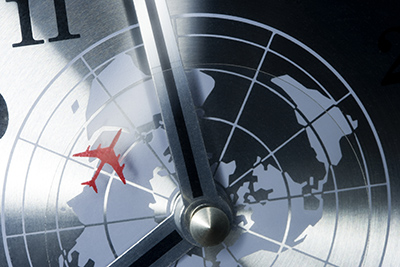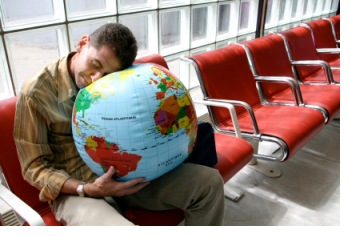 Summer has arrived, and many students?even online ones?will be on the move. You might be travelling to an exotic destination, visiting family, or exploring Canada coast-to-coast. If you’re heading east or west, you might cross one or more time zones. Time zone-hopping can prompt that other traveller’s scourge: jet lag.
Summer has arrived, and many students?even online ones?will be on the move. You might be travelling to an exotic destination, visiting family, or exploring Canada coast-to-coast. If you’re heading east or west, you might cross one or more time zones. Time zone-hopping can prompt that other traveller’s scourge: jet lag.
Jet lag is a disruption to your body’s natural circadian rhythm and results from travelling long latitudinal distances quickly?jumping from one time zone to another without adequate time to adjust. Despite its name, Jet lag is not exclusive to the flying public?it’s possible to experience jet lag travelling by car or train, too.
How jet lag will affect any individual depends on several factors. The most influential factor is how many time zones are crossed. Adjusting to a 12-hour time shift is more difficult than for a 2-hour shift. Direction of travel is a factor too. Heading east across several time zones is often noticeably worse than heading west. Other contributing factors are time of year and the traveller’s state of physical fitness.
Jet lag produces symptoms of tiredness, irritability, headaches, reduced ability to concentrate, as well as disruption to sleep and eating schedules. The severity of symptoms varies from person to person: two people travelling together may not experience the same degree of jet lag.
There are a number of strategies for reducing the effects of jet lag. With some advance preparation, you can bounce back quickly from the journey and spend more time enjoying the destination. Here are a few jet lag-reducing strategies:
Wait it out. The general rule is that you will need one day to fully recover from every hour in time change. If you travel from Vancouver to Halifax, crossing four time zones, you can expect four days until your body’s circadian rhythm catches up. Travel from Toronto to Turkey (seven time zones), and you’ll need a full week. Letting yourself recover naturally works best when your stay in the new time zone will be lengthy. Remember that you’ll need to re-adjust if and when you return to your starting point.
Stay stubbornly in your home zone. If your stay in another time zone will be short, for a weekend getaway or a conference for example, you can try sticking to the time in your home zone. Keep your watch set to your home time and eat and sleep accordingly. When you return home, you’ll need minimal re-adjustment. This strategy can be challenging, however, if you’re required to follow someone else’s schedule for meetings or meals. Be sure to keep “your” time and “their” time straight!
Pre-adjust. A week or so before you leave home, begin a gradual shift toward your destination’s time zone. If you’ll be travelling east, start eating meals and going to bed increasingly earlier; if you’re heading west, shift meals and bedtime later. This strategy can reduce the severity of jet lag because you’re reducing the gap between home time and destination time. A mobile app, such as the Jet Lag App can help plan a schedule of pre-adjustment.
Re-adjust waking. A key element in re-setting your circadian rhythm is sunlight. The first morning you arrive at your destination, force yourself to get up at the hour you usually would. Then get outside for a quick walk. The exposure to natural light will send signals to your body which will help reset your sleep-wake cycle to match the current time zone. Seek out sunlight every morning but avoid bright lights in the evening. A mobile app such as Jet Lag Rooster can help plan your light exposure routine for quick jet lag re-adjustment.
Re-adjust sleeping. Another strategy to help reset your circadian rhythm is melatonin. Melatonin is a hormone your body produces in response to dim light, which helps ease the body into its sleep cycle. Melatonin tablets can be purchased wherever health supplements are sold in Canada, and are often helpful to counter temporary sleeplessness. One dose of melatonin at bedtime on your first night at your destination may help you get to sleep even though your body hasn’t adjusted yet. Melatonin is also helpful to assist with sleeping during travel, such as on an overnight flight. Save melatonin for the rare occasions when you really need it, otherwise its effectiveness may diminish.
Jet lag is an inconvenient and sometimes debilitating side-effect of travelling across time zones. If your summer travel plans include crossing several time zones, then a jet lag strategy should be a part of your travel plans. Save summer for enjoyment and not recovery.
Barbara Lehtiniemi is a writer, photographer, and AU student. She lives on a windswept rural road in Eastern Ontario.


